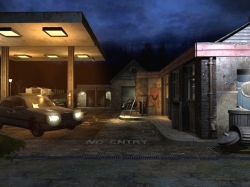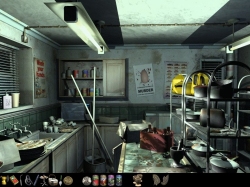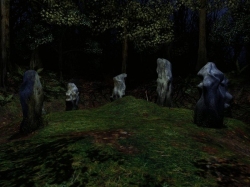|
Barrow Hill
 A car drives along a lane, then simply stops. It will go no further. On foot, a service station
is reached. A car sits idling without an occupant, a café has food but no customers.
Or anyone else. The place is abandoned except for Ben, who won't come out.
A car drives along a lane, then simply stops. It will go no further. On foot, a service station
is reached. A car sits idling without an occupant, a café has food but no customers.
Or anyone else. The place is abandoned except for Ben, who won't come out.
Look around. 3 hotel rooms, keypads requiring a code to enter. A darkened kitchen, and darker
woods.
Up on the hill sits the Barrow. Shrine or crypt? Mystical or merely archaeological? Seven stones
stand watch, seven stones with names. Henrik and Hammer Stone, Melkah and Cailleach. Watching
what?
Others are watching back. A dig has commenced. Trenches are opened, artifacts found. The modern
world watches via CCTV, the ancient world watches through something far stranger.
Something has awoken. You must restore the balance.
Matt Clark, the maker of this point and click adventure game, clearly respects the land and
its legends. In Barrow Hill he has blurred the dividing line between the ancient and
the modern to create an atmospheric Cornish tale of supernatural intrigue.
I have seen Barrow Hill described as horror, but if you are disinclined towards such
games, don't be put off this one. This is horror in the suggested, intimated, traditional sense,
not buckets of blood and lashings of gore. Through an excellent use of sound and music, and
established horror staples (eg dark woods surround the oasis of light that is the service station,
a swamp hides a ruined church), a nervous and spooky ambience fills Barrow Hill and its surrounds.
The juxtaposition of the old and new is a characteristic that I thought worked extremely well.
How do you resolve an ancient dilemma with the bits and pieces found in a 21st century service
station? And how can GPS systems, PDAs, mobile phones and metal detectors offer any assistance
when dealing with an arcane, unseen and unknown protagonist? Barrow Hill is an old place, and
the intrusions of the modern world are the things which seem out of place.
 The majority of the puzzles require finding and correctly using items, or unravelling information
from the journals, letters and notes scattered around. Not everything is vital, but much adds
to the depth of the story and the environment. So too not everything you can examine results
in something to take with you. It makes sense; to find the useful items you need to look at
a lot of the mundane. Ditto with certain actions; if I can turn that on, can I do anything
with it, or does it just turn on because it does?
The majority of the puzzles require finding and correctly using items, or unravelling information
from the journals, letters and notes scattered around. Not everything is vital, but much adds
to the depth of the story and the environment. So too not everything you can examine results
in something to take with you. It makes sense; to find the useful items you need to look at
a lot of the mundane. Ditto with certain actions; if I can turn that on, can I do anything
with it, or does it just turn on because it does?
The array of aforementioned gadgets will come in handy on more than one occasion. They aren't
overdone and add an additional element to several puzzles. The phone plays a leading role late
in the game, and the first time it rang as I crept along a dim path I jumped a few inches.
Not as much as when I disturbed the crow though. Things that go "bump" are always good for
a fright.
Clues abound as to what to do next, but the game seems to be fairly open. Some locations are
only accessible when certain points are reached, but there is a fair degree of flexibility
in how you move through the game and what you do when.
There is also (helpfully) a certain degree of redundancy in the game. You might fail to find
or recognise the significance of a particular piece of information, but that won't necessarily
prevent you from solving the puzzle to which that information relates. Other means are available,
and triggers are often a combination of various exploration events, rather than a single "must
do". This helps avoid stuckness, and rewards interaction and exploration.
The intuitiveness of the puzzles in Barrow Hill were a strong point also. It was clear
on one occasion that I should do "x", the decision gleaned from the events and circumstances.
I later found a clue pointing to "x" that had eluded me at the time. Neither my decision or
the game required that I find the clue in order to move forward.
The few straight puzzles were not difficult, and I didn't think the game itself was terribly
hard, but it requires you to be attentive, and to take notes and ponder. Certain situational
puzzles will likely only be resolved by pulling together several threads, and the information
will be found right across the game. I completed a small inventory task early on that was completely
inexplicable at the time, but at some point the "a-ha" factor kicked in and helped distil several
other notes I had taken. Fittingly, the means to "restore the balance" is a many layered task
that gave me a particular amount of satisfaction to have cracked.
An aspect of game play I rather liked was the way inventory items are used. Perhaps it's simply
the need to click less, but not only do all the inventory items appear when the mouse is moved
to the bottom of the screen (or the top for certain items) but if you can use the item in the
place you are at, simply clicking it will cause it to be used. You still have to be in the
right spot (eg in front of the locked door) and you have to have found and selected the correct
items, but one click will get you home. A small point, but in my opinion a definite improvement
on, say, right click for inventory, select item, right click to get back to game, left click
to try item, repeat all over again if that item isn't correct.
 Barrow Hill looks and sounds good, as it probably should given the effort that was expended
on capturing the sights and sounds of Cornwall. Digital recording of the environment occurred,
and thousands of photos were used to assist the software rendering. The sounds are particularly
poignant, and it's the little ones that make a difference. Scraping a branch, treading a forest
trail; realism helps the immersive gaming experience.
Barrow Hill looks and sounds good, as it probably should given the effort that was expended
on capturing the sights and sounds of Cornwall. Digital recording of the environment occurred,
and thousands of photos were used to assist the software rendering. The sounds are particularly
poignant, and it's the little ones that make a difference. Scraping a branch, treading a forest
trail; realism helps the immersive gaming experience.
You don't have the 360 degree panning of games like Scratches, but the humble slide show (a
la Myst) nevertheless creates a 3D world of substance, not at all a flat, lifeless canvass.
No doubt this is a product of "quality data in, quality data out" (at least I think that's
the technical explanation).
Hotspots and a small array of icons will indicate things to do and directions to go. You turn
90 degrees from each successive location, and finicky orientation is therefore largely non-existent.
The menu screen is accessed from the icon at the top of screen, where saving, loading, and
minimal tweaking can be accessed. Subtitles are not available, but inventory descriptions are,
which I found useful late in the game.
Barrow Hill starts and ends with a grainy black and white movie sequence which neatly
frames what comes in between. There are two endings, one correct and one not. The plot is no
more fanciful than many a supernatural tale, and the "morals" within are not at all belaboured.
You don't die, but perhaps you should, given the goings on. Or perhaps you do, except the game
simply takes you back one place prior to the fatal move. Whether it is a warning or a "second
chance" really doesn't matter too much, except that I thought a more definitive punctuation
would have been appropriate. Mr Clark, however, is no doubt aware of the allergy many players
suffer when "death" occurs in adventure games, so has clearly chosen to spare them the symptoms.
It comes on DVD (not available on CD) and ran flawlessly.
Barrow Hill is an impressive independent game and continues to show the slide show is
not dead when it comes to providing a thoroughly satisfying 15 or so hours of adventure gameplay.
It's a different approach, not necessarily an inferior one. Well structured, carefully presented,
and by all accounts meticulously designed, Barrow Hill delivers a Cornish sojourn definitely
worth taking.
You can purchase Barrow Hill at the Shadow
Tor Studios web site.
See the metzomagic.com Barrow Hill walkthrough.
Copyright © Steve Ramsey 2006.
All rights reserved.
System Requirements:
Pentium III 450 MHz or better, Windows 98se/2000/XP, 128 MB RAM (256
MB recommended), DVD ROM, SVGA graphics card with 32 bit colour. DirectX 9 compatible sound
card.
|

